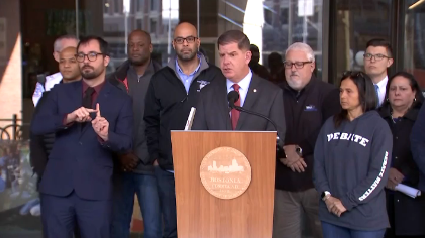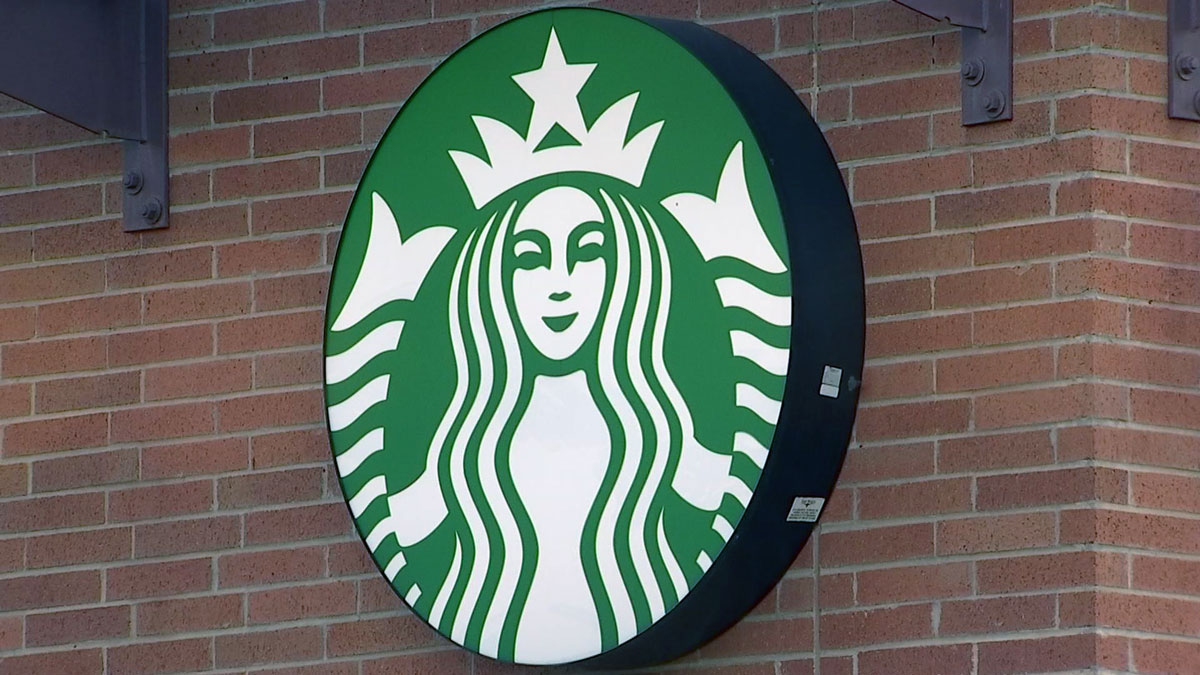Gov. Charlie Baker on Sunday ordered all Massachusetts public and private elementary and secondary schools to close for three weeks, as public health officials announced there are now 164 coronavirus cases in the state.
It was the most significant in an "unprecedented" slate of orders and proposed legislation that Baker put forward Sunday evening, his broadest attempt yet to limit the spread of the new coronavirus, which has killed more than 60 people nationwide, in the commonwealth.
Other actions announced Sunday include limiting the size of gatherings, restricting where people can eat at restaurants and who can visit hospitals and nursing homes, and expanding when people can file for unemployment -- the outbreak is expected to have a deep impact on the economy and jobs market.
Baker said the three-week suspension of educational services is out of an abundance of caution for the health and safety of children and school staff and given the evolving data regarding the cases of COVID-19, the disease caused by the coronavirus.
The school closures go into effect Tuesday and will remain in place through April 7, the governor said.
"I'd like to thank Governor Baker for taking the step that many residents, Senators and myself have called for: implementing a statewide approach to school closures," Massachusetts Senate President Karen Spilka said in a statement.
Officials understand that many districts rely on school buildings for essential services outside of educational programs, like meal programs and special education, Baker said. Closing down schools for classes will not impact these types of services, he argued, and officials will work with school districts to keep school buildings open whenever possible to continue to offer these services.
While schools must suspend in-person educational operations, Baker said that staff should be planning for how to equitably provide alternative access to learning opportunities during this period and potentially beyond.
"It's important that we all take a couple of minutes to think about why dispersing classes and school gatherings is necessary to help us mitigate the spread of COVID-19," he said. "Our public health officials have made clear COVID-19 will feel like the flu for the vast majority of the people who get it but it's highly contagious. By breaking up large gatherings and encouraging social distancing, we can prevent the spread, but we can't simply transfer a group full of kids from the classroom to a neighbor's playroom for days on end. We will not be doing our part to prevent the spread if there are a ton of kids hanging out, playing video games and sharing snacks every day from one house to the next."
Baker urged parents and caretakers to use the next three weeks to truly practice social distancing, meaning maintaining a safe separation of at least six feet from others.
"This means no free-for-all playdates and more time at home with only immediate family for the next three weeks," Baker said.
Although he is not ordering the closure of child care programs, Baker said, he is strongly urging child care providers to strictly observe guidelines that are being issued by the Department of Early Education and Care and the Department of Public Health.
This order does not apply to residential schools for special needs students or other group homes, Baker said.
With regard to higher education, Baker said it is strongly recommended that colleges and universities, both public and private, continue to pursue strategies to reduce the need for students to be on campus and shift to remote learning to allow students to successfully complete courses.
Among the other coronavirus-related actions announced Sunday were:
- Any restaurant, bar or establishment that offers food or drink won't be allowed to serve food on-premises, effective Tuesday, March 17, and continuing through April 6. Instead, they can offer food for takeout or delivery. They must also follow social distancing protocols outlined in Department of Public Health guidance. The order does not apply to grocery stores or pharmacies, Baker said: "This is about bars and restaurants and those places people do not absolutely have to go."
- Gatherings of over 25 people will be prohibited, including all community, civic, public, leisure, faith-based events, sporting events with spectators, concerts, conventions and any similar event or activity that brings together 25 or more people in a single room or a single space at the same time. This includes venues like fitness centers, private clubs and theaters. This order amends last week's guidance that prohibited gatherings of 250 people or more.
- Emergency regulations will be filed to expand eligibility around collecting unemployment for people who have been impacted by COVID-19.
- Some requirements will be relaxed around current unemployment claims, allowing many workers who are affected by closures to get some financial relief faster.
- Emergency legislation will be filed to allow new unemployment claims to be paid more quickly by waiving the one-week waiting period for unemployment benefits that currently exist under state law.
- Long-term care facilities and nursing homes will be prohibited from allowing any visitors.
- Hospitals will be required to screen visitors and restrict visitation.
- The Registry of Motor Vehicles will extend the renewal timeline for certain credentials to reduce the need for customers to physically visit an RMV service center for in-person transactions.
- Hospitals will be directed to postpone elective surgeries to ensure medical workers and hospital space is available.
- All commercial health insurance carriers will be ordered to allow providers to deliver services via Telehealth, allowing people to avoid physically going anywhere should they need to consult a medical professional.
- A legislative package will be filed to help address challenges surrounding the municipal governance issues that have been raised by many cities and towns, including potential delays and holding town meetings and adopting Fiscal Year 2021 municipal budgets.
- While it was announced last week, legislation will be filed Monday to officially postpone the Boston Marathon until Monday, Sept. 14, 2020.
"I realize these measures are unprecedented. But we are asking our residents to take a deep breath and understand the rationale behind this guidance," Baker said. "As we said yesterday, grocery stores are getting restocked. The reason we are seeing bare shelves on the news and when we shop is because people are taking stocking up a little overboard. Just remember if you buy two years worth of canned soup, that just means your neighbor may have to go without."
Baker also addressed rampant rumors regarding a shelter-in-place order, saying he has no plans for that.
"Everybody needs to get their news from legitimate places, not from their friend's friend's friend's friend," he said.
For the vast majority of people, approximately 80% of the population, getting infected with the coronavirus will mostly feel like the flu and will not lead to hospitalization, Baker said.
"But the reason we are taking this so seriously is because it is incredibly contagious," he said. "There will be more cases of COVID-19, but we also know that if we take decisive steps now and everyone plays their part by following the best medical guidance, we can slow down the spread, and our healthcare system can be better positioned to care for the people who need it."
The number of residents who have already been tested for COVID-19 jumped from 475 Saturday to nearly 800 Sunday, health officials said Sunday. Baker said expert teams will plan to expand lab capacity for testing and will plan quarantine operations as well.
Twenty-six new cases were announced earlier Sunday, a day after restrictions were loosened on testing protocols.
New guidance from the U.S. Centers for Disease Control and Prevention only requires clinicians to submit one nasal swab, as opposed to submitting both nasal and throat swabs that were required before. With the change in clinical testing protocols, and new guidelines put in place by Massachusetts this weekend, the state lab's testing capacity has doubled, increasing to approximately 400 patients a day, up from 200.
Massachusetts clinicians now also have more flexibility to determine which patients should be tested without having to call the Department of Public Health’s Epi Line.
With more clinical labs in the Bay State working to get FDA approval, health officials say even more testing capacity will be available soon.
Forty-five of the state's 164 positive cases have been subsequently confirmed by the CDC.
Four of the 26 new cases announced Sunday are related to the employee meeting held at a Boston hotel by the Cambridge biotech firm Biogen last month. Health officials say 108 of the 164 cases are now tied to the Feb. 24-27 meeting held at the Marriott Long Wharf hotel, which has since closed "in the interest of public health."
Included in the new cases is a health care worker at Boston's Brigham and Women's Hospital. The hospital announced the case Sunday morning and said patients and staff who may have had contact with the infected worker are being contacted.
Eight more cases are associated with travel, bringing that total to 13. Eight remain associated with a cluster in western Massachusetts and 35 of them are now under investigation, health officials say.
Northeastern University announced in an email Sunday that one of its students living in off-campus housing in Boston tested positive for COVID-19 at a Boston-area hospital. a Boston-area hospital. School officials say this student, who has been in isolation since Thursday, March 12, will remain in isolation at an off-campus apartment.
The Boston Public Health Commission is reviewing the student's movements since returning from spring break on Monday, March 9, and any individuals who may have been in direct contact with the infected student will be notified.
"We realize that knowledge of this positive test will surely increase anxiety among the Northeastern community. This is understandable," the university said in its email to students, faculty and staff. "A positive test result—presumptive or confirmed—underscores the need for the university to continue its swift and comprehensive response to the COVID-19 outbreak."
Of the state's 164 cases, 74 are women and 90 are men. Middlesex County residents still account for nearly half, 75, of the cases statewide. Norfolk and Suffolk counties both have 31 cases, while there are nine cases in Berkshire County. There are now six cases each in Essex and Worcester counties.
Plymouth, Hampden, Barnstable and Bristol counties have one case each. Two cases are of unknown counties at this time.
Two more patients have been hospitalized, bringing the total to 13 so far, though 36 other cases are listed as being under investigation, according to Sunday's figures.
Boston EMS urge people to not call 911 to request COVID-19 testing. People are asked to call their primary care providers, the mayor's health line at 617-534-5050, or the state DPH information line at 211.
Virus-related symptoms include fever (100.4°F or higher), cough, trouble breathing or shortness of breath.
Baker said that, in addition to the role we all have to play in pushing back against this virus, there are other things we can do. Call neighbors, friends and your families, he said, adding that those friendly check-ins can help someone through their day.
Do you have symptoms of coronavirus and wish to get tested? We want to hear about your experience. Please share your contact information with the NBC10 Boston Investigators here or email tips@nbcboston.com.



